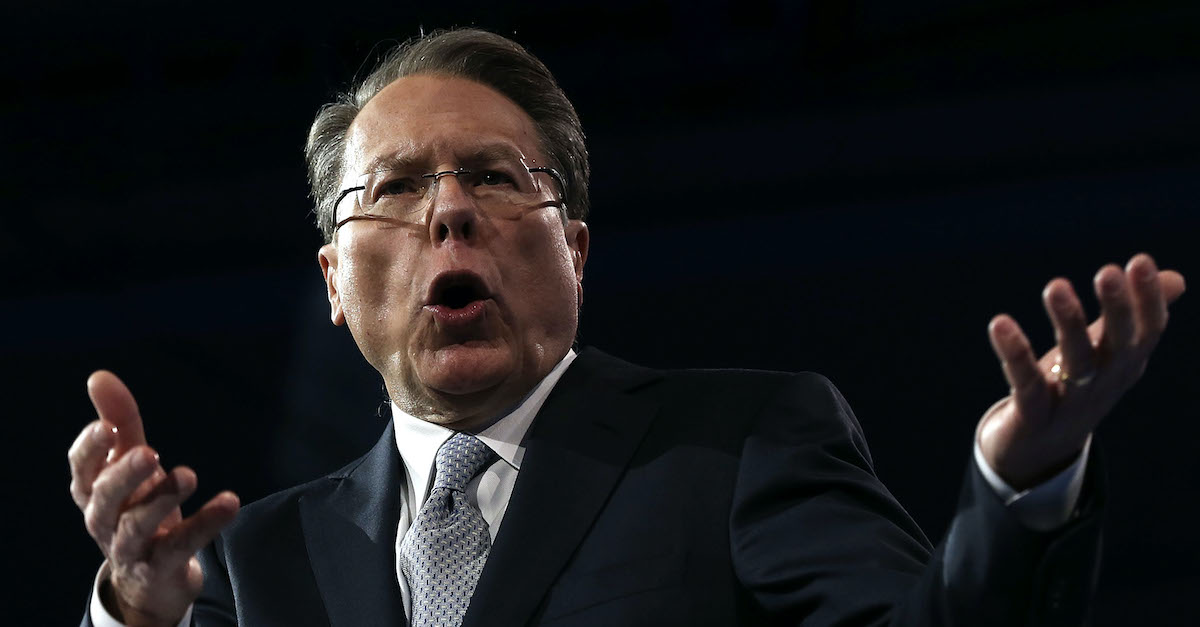
Wayne LaPierre
Nearly four months after New York’s attorney general filed a lawsuit seeking to dissolve the National Rifle Association (NRA) for allegedly letting top employees use funds for their own benefit, the non-profit organization confirmed that current and former executives used NRA funds for personal enrichment, the Washington Post reported Wednesday.
According to the report, the NRA’s latest tax filings, which the organization provided to the Post, outright stated that the NRA “became aware during 2019 of a significant diversion of its assets,” declaring that CEO Wayne LaPierre and five former NRA executives received “excess benefits” connected to their employment.
“The disclosures in the tax return suggest that the organization is standing by its 71-year-old chief executive while continuing to pursue former executives who left the group. The filing says that LaPierre ‘corrected’ his financial lapses with a repayment and contends that former executives ‘improperly’ used NRA funds or charged the nonprofit for expenses that were ‘not appropriate,’” the report stated.
The returns also said that LaPierre had paid back approximately $300,000 for travel expenses that were incurred between 2015-2019, though the NRA did not specify when the money was paid back or how the organization and its leader reached that number.
In a statement to the Post, NRA spokesman Andrew Arulanandam said that “the vast majority” of LaPierre’s travel expenses were undertaken “in strict compliance with NRA policy.”
Charles Cotton, an NRA vice president and audit committee chair, told the Post that its tax filings showed that “the NRA is committed to strict compliance with its accounting controls and good-governance practices.”
As previously reported by Law&Crime, New York State’s lawsuit accused LaPierre of using the organization as his own personal piggybank while also awarding contracts to close associates and family and granting lucrative no-show contracts to former employees in order to buy their silence and continued loyalty.
Specifically, LaPierre is accused of traveling with his family to the Bahamas by private plane at least eight times over an approximate three-year period, costing the organization more than $500,000. On many of those trips, LaPierre and his family were gifted the use of a 107-foot yacht owned by an NRA vendor. He and his wife also traveled to Africa for all-expenses paid safaris, gifted by an NRA vendor.
Additionally, LaPierre allegedly received than “$1.2 million in expense reimbursements in just a four-year period for expenditures that included gifts for favored friends and vendors; travel expenses for himself and his family; and membership fees at golf clubs, hotels, and other member clubs.”
The suit also accused former Treasurer and Chief Financial Officer (CFO) Wilson “Woody” Phillips, former Chief of Staff and the Executive Director of General Operations Joshua Powell, and Corporate Secretary and General Counsel John Frazer of failing to manage the NRA’s funds and failing to follow numerous state and federal laws.
New York-based attorney Daniel Kurtz, who specializes in non-profit law, told the Post that the admission would likely work in the NRA’s favor.
“It’s a smart move by the NRA instead of digging in their heels, though who knows how they came up with the numbers,” he said, adding, “It’s an admission of wrongdoing, for sure.”
[image via Alex Wong/Getty Images]